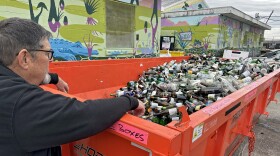Christina Dent never imagined she'd become an advocate for legalizing drugs.
A self-described conservative Christian mom from Jackson, Mississippi, Dent spent most of her life far removed from the world of addiction — until she met a woman whose addiction had led to the removal of her child.
That encounter launched what Dent calls her “learning journey,” and ultimately led her to found End It For Good, a Mississippi-based nonprofit pushing for new approaches to drugs, addiction and public safety.
In a conversation with the Gulf States Newsroom’s Drew Hawkins, Dent talks about her book “Curious: A Foster Mom’s Discovery of an Unexpected Solution to Drugs and Addiction,” and how her experiences as a person of faith and lifelong Mississippian led her to reexamine everything she thought she knew about addiction.
In the book, Dent explores why Mississippi’s punitive approach has failed and how drug policy can align with conservative values. In the conversation, she also highlights how the state can best use its $300+ million in opioid settlement funds — to support real recovery by investing in evidence-based treatment, lived experience and new, innovative solutions.
The following conversation has been edited and condensed for clarity.
You've been on what you call a “learning journey.” And now, you're advocating for a new approach to how we approach drugs and addiction. Can you talk about this learning journey and how that shift happened?
I'm a born and raised Mississippian and really never came close to drugs and addiction until I became a foster mom in my early 30s. I met a woman named Joanne, who was my same age, and had struggled with an addiction for most of her life. Her son became our foster son. What I learned from Joanne was that she was a mom, like me, who loved her son just as much as I loved my three sons. Her addiction wasn’t about character flaws. It was a complex health crisis.
Joanne helped me realize how much judgment I had in my own heart, even though I considered myself a very empathetic person. That set me on this learning journey. I always tell people you shouldn’t make policy based on a personal experience, but you can have an experience that opens your mind. That’s what happened [to] me.
In your book, you talk about "blind spots." What does that mean?
It’s all the things we just kick ourselves for not seeing. All of us have blind spots. I still have blind spots. Joanne let me see just what a wonderful and amazing person she is in spite of struggling with an addiction. We look back at past generations and think, wow, they got X, Y, Z really wrong. Blind spots are just a part of the human experience. If we want to see them sooner, we need awareness and humility.
Is this issue of drugs and addiction a blind spot? Is [this] something that we have approached the wrong way for 10, 20, 50 — 100 years now?
Will our grandkids look back and say: “How could you continue to incarcerate people for a problem you knew was made worse by trauma? How could you have continued to push these drugs into underground markets that were fueling violence around the world. Why didn't you take stock of that?”
And that's the opportunity that we have now — to cut off some of those years where we continue down this same failed path and to be able to right some of these wrongs and take a different approach. So that that blind spot can be corrected as quickly as possible and we can move one more step on the staircase of human progress.
You say your values didn’t change — your understanding did. Can you explain how you reconcile your shift in thinking with your Christian and conservative values?
For me, it was really important that wherever I landed was consistent with my faith. I still believe in small government, in personal freedom, in empowering people to work. I made a spreadsheet — one side was for the benefits of prohibition, and the other side for the costs. After months, I had just a few on the benefits side and about 500 on the cost side.
That’s a big reason I wrote my book — I wanted to give the perspective of a conservative Christian who still holds those values but now believes this is the best expression of them.
Just because I believe the best way to reduce harm is through legal regulation doesn’t mean I think people should go get high. I’m not advocating for the Bible to become law. We don’t arrest people for coveting or adultery. We recognize that not everything sinful should be criminal. I believe the government should take a different approach to drugs than what a church might teach — and that’s OK.
You started by having small conversations in your community. How did that grow?
I come from a family of crusaders. My mom was always living out what she believed. So I just did what I knew how to do: gather people to talk. That turned into an organization, a team and a movement. But it’s not my movement. It’s a collective “we.”
There are a lot of people already rethinking this, they just don’t know how to voice it in a system so focused on criminalization. We gave people a space to say, “Wait a second. We’re getting this wrong.”
You don’t shy away from controversial ideas, like drug legalization. How do you approach that conversation?
I’m a very boring person — I’ll go home from this and read a book on my couch. But yeah, I remember the first time someone asked me if I thought drugs should be legal. I was so angry I left the room. What I heard was, “Do you think everyone should destroy their life with drugs?"
But I always like to back up and say, let's leave that word out of it until we understand the problem that we're facing. Which is why then I think that this word legal begins to make sense to us.
The three big components of harm from drugs that people are typically worried about are crime, overdose and addiction. Most crime related to drugs comes from the fact that the market is underground. There’s violence, there’s no regulation and there’s contamination—fentanyl, xylazine, nitazines.
You can’t regulate a banned market. And when you arrest people for possession, you destabilize families. One in four Mississippi adults has a criminal record. That affects employment, housing and community safety. The easiest way people enter the criminal justice system is through a drug charge.
If we want to reduce crime, overdose and destabilization, we need to move to legally regulated markets. Addiction should be treated as a health issue, not a crime. That doesn’t mean people get a free pass. If you’re abusing your child or committing theft, the law should intervene. But we shouldn’t arrest people for possession when no harm is happening.
Do you feel like public attitudes in Mississippi are changing?
I was invited to lead a book discussion at a sheriff’s department by the sheriff himself. That felt intimidating — 30 law enforcement officers in one room — but it was a great discussion. One officer said, “I’ve seen this over time. It makes sense to me.”
Especially with older officers, I see a shift. They’ve put their lives on the line for decades, and the problem isn’t getting better. We’re starting to have new conversations.
Legislators are more open, too. Rep. Sam Creekmore is working on legislation around Ibogaine, a psychedelic being used in addiction treatment and PTSD. There’s excitement to find better solutions. People are tired of doing the same thing and not getting results.
Mississippi is receiving over $300 million in opioid settlement funds. What’s the best way to use it?
We need to ask three words: Does it work? That’s shockingly absent in a lot of policy and treatment. We need a proven track record. We shouldn’t use this money to prop up programs that have failed.
And we absolutely need people with lived experience at the table. I work on this full time, but I don’t have lived experience with addiction. They can see the loopholes and what actually helps. This is a once-in-a-lifetime opportunity. Let’s fund what works — and let’s bring new treatment options to Mississippi, like neuroelectric therapy, Ibogaine and expanded telehealth access. There’s a lot we can do if we get this right.
This story was produced by the Gulf States Newsroom, a collaboration between Mississippi Public Broadcasting, WBHM in Alabama, WWNO and WRKF in Louisiana and NPR. Support for public health coverage comes from The Commonwealth Fund.













